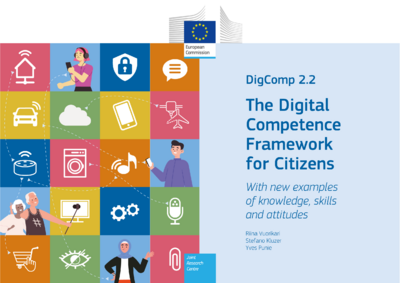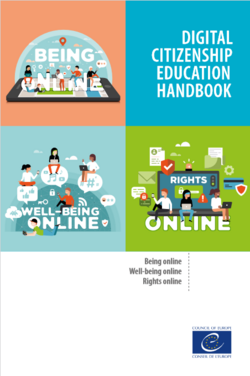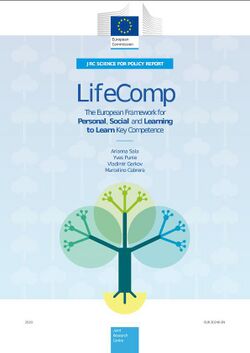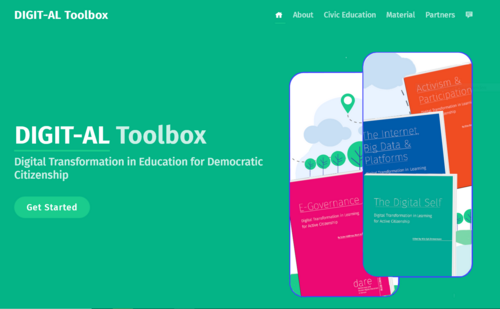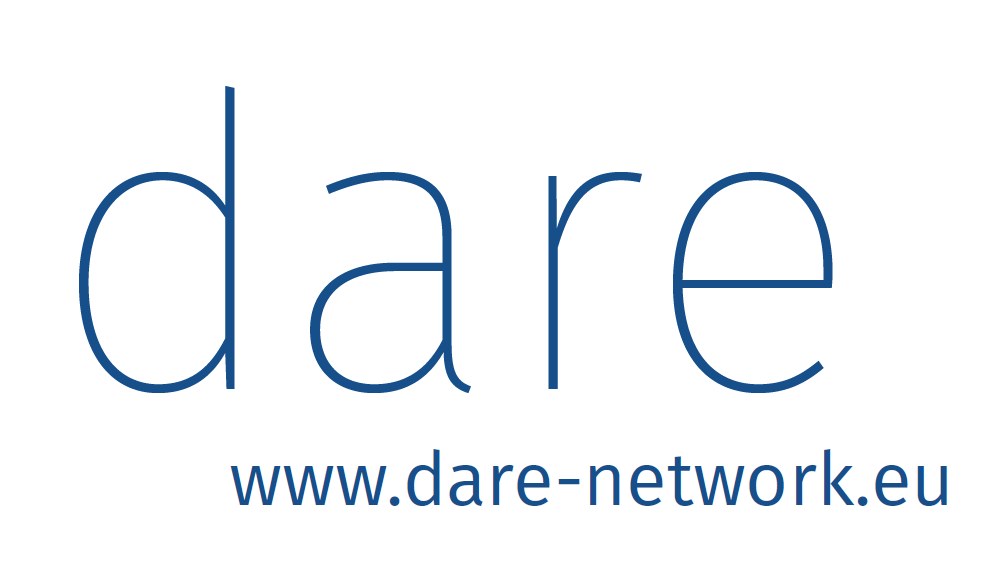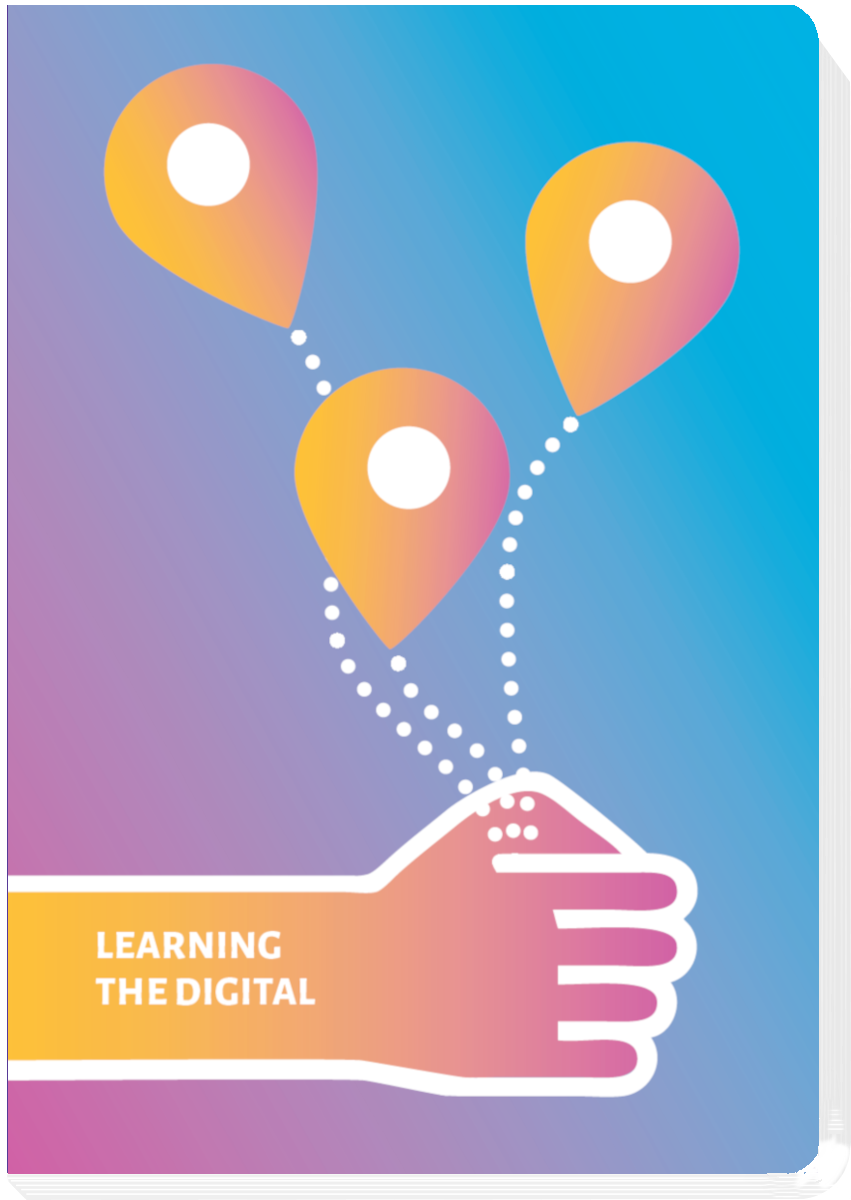The issue of digital competences has shifted to the centre of the European cultural and political debate and pedagogical approaches (e.g., media pedagogy, data literacy, robotics, ICT training, art education). The variety of the contributions by academics from universities, practitioners and professionals from CSOs and representatives of public institutions that have nurtured this debate has been systematised in various competence frameworks and educational contexts. Below, we list in chronological order the main documents from the European context. Some of them start from a general citizenship perspective while others refer to a specific sector, where the educational one emerges as the most important. In general, there is a tendency towards a holistic understanding of digital competence as a complex set of values, attitudes, skills and knowledge.
Contents
MAIN DOCUMENTS
2013 DigComp 1.0: focus: citizens
2015 DigCompOrg: focus: educational organizations (Kampylis, Punie & Devine, 2015)
2016 DigComp 2.0 focus: citizens (Vuorikari et al., 2016)
2017 DigComp 2.1 focus: citizens (Carretero Gomez et al., 2017)
2017 DigCompEdu focus: educators – teachers and trainers (Redecker, 2017)
2017 Reference Framework of Competences for a Democratic Culture (Council of Europe, 2017)
2019 Council of Europe: Digital Citizenship Education Handbook (Council of Europe, 2019)
2020 LifeComp (Sala et al., 2020)
2022 DigComp 2.2 (Vuorikari, R., Kluzer, S., Punie, Y., 2022)
Here we look at the most recent frames, DigComp2.2 and DigCompEdu.
DigComp
The DigComp Digital Competences model has its roots in the research activity that the Joint Research Centre of the European Commission (JRC) started in 2005 to support policy-making regarding the potential of digital technologies in certain priority fields: education, the world of work, personal growth and social inclusion.
It brings a useful perspective for planning in the field of education, training and employment – most technical/digital skills and for digital competences assessment and certification.
The framework has been progressively refined; an update of the framework is expected to be released in the first part of 2022. DigComp identifies a set of 21 competences divided into 5 areas: 1. Information and data literacy
2. Communication and collaboration
3. Digital content creation
4. Security
5. Problem solving
Although the areas of competences are very useful for assessing the level of basic skills with respect to the use of digital tools (especially in terms of comparison between different countries, and age groups, gender, etc., there is a limitation – already highlighted and argued in our brochure series, “Smart cities, smart teaching”, which concerns the lack of understanding of the cultural and social dimension or a less explicit integration of the citizenship dimension of the digital transformation and its consequences. For each competence, eight levels of proficiency are identified, ranging from “basic” to “highly specialised” according to three criteria: the complexity of the tasks, the autonomy required and the cognitive domain involved.
In terms of assessment, the examples provided refer to two domains: the world of work and the world of learning with an exclusive focus on the formal sector. However, for each competence, examples are given for only one level of mastery. This, in our opinion, limits the possibility of comparison between the different levels. Moreover, the examples provided mainly refer to the dimension of “knowing how to do” rather than “knowing how to be”.
DigCompEdu
DigCompEdu (Redecker, 2017) has a specific focus on the world of formal and non-formal education. The digital competence framework was developed for teachers and trainers and identifies a set of 22 competences divided into six areas:
1. Involvement and professional development
2. Digital resources
3. Teaching and learning practices
4. Assessment of learning
5. Enhancement of students' potential
6. Promoting the development of students' digital competences
The proposed categorisation is graphically represented by the intersection of three macro-areas of competence:
DigCompEdu: The Macro Competence Areas
The professional competences of the teacher/trainer intended as digital competences functional to the communication and to the professional interaction with the other actors of the educational organization; to the improvement of the organization in which one works; to one's own professional growth as teacher/trainer (area 1);
The didactic competences of the teacher/trainer which revolve around the ability to design, implement and evaluate the educational intervention in the light of the opportunities and constraints offered by a learning environment based on – or at least, supported by – the use of digital technologies (areas 2, 3, 4, 5);
Learner competences are understood as those transversal digital competences whose development in the learner strongly depends on the ability of the teacher/trainer to master them and use them in his/her educational activity (area 6).
DigCompEdu was published in 2017, the same year in which the latest updated version of DigComp was made available. This contemporaneity should be understood as an indicator of continuity and correlation between the two publications. It is no coincidence that the student's digital competences take up the five areas already proposed in DigComp (information and media literacy; digital communication and collaboration; digital content creation; responsible digital use; problem solving).
Moreover, an interesting element that emerges from the DigCompEdu framework is the proposed rethinking of the figure of the teacher/trainer. The great potential of digital technologies is in fact identified in their ability to shift the educational focus onto the learners, creating opportunities for educational personalisation and facilitating forms of collaborative and self-regulated learning. The challenge for those who play the role of teacher/trainer is identified in the ability to govern these processes through a careful planning phase that leads to identifying and practicing the most appropriate forms of support for learning at the individual and collective level. The reference model for the teacher/trainer is therefore always closer to the figure of the facilitator of processes rather than that of the depository of knowledge.
Digital Citizenship Education
Digital Citizenship Education Handbook of the Council of Europe (Frau-Meigs et al. 2017) originates from the EDC/HRE sector. The Council of Europe's reference framework for digital competences is the Reference Framework of Competences for Democratic Culture (RFCDC). It is interesting to note that in the same year as RFCDC was published (2017), the Council of Europe commissioned a comparative study of the concept of digital citizenship and concluded that digital citizenship refers to the following dimensions:
- competent and positive engagement with digital technologies (creating, working, sharing, socialising, investigating, playing, communicating and learning);
- participating actively and responsibly (values, attitudes, skills, knowledge) in communities (local, national, global) at all levels (political, economic, social, cultural and intercultural);
- being involved in a double process of lifelong learning (in formal, informal, non-formal settings);
- continuously defending human dignity.
RFCDC explicitly refers to both the physical and digital dimensions and identifies 20 competences relevant to various educational domains: democratic citizenship education, human rights education, intercultural education and digital citizenship education (RFCDC, vol.1, p.32).
To facilitate the adoption of this perspective in educational practice, the Council of Europe has systematized the reasoning behind digital competences in the publication “Digital citizenship education handbook”. Here, a set of ten digital domains has been defined and grouped into three areas: being online, well-being online, rights online.
Digital Citizenship Education: Competence Dimensions
Being online
- Access and inclusion
- Learning and creativity
- Media and information literacy
Well-being online
- Ethics and empathy
- Health and well-being
- e-Presence and communications
Rights online
- Active participation
- Rights and responsibilities
- Privacy and security
- Consumer awareness
The areas and competences listed are not only the transposition of citizenship competences into the digital sphere. Rather, these competences recognize the need for citizens to develop awareness of the role of the digital sphere in society and their lives, that it is an integral part of how people relate to one another, and that it concerns institutional and civil democratic process as a whole.
2020 LifeComp: Learning to learn
LifeComp (Sala et al., 2020) is the most recent competence framework developed by the Joint Centre (JRC) of the European Commission's science and knowledge service. The “European Framework for Personal, Social and Learning to Learn Key Competence” adds an important aspect for any key-competence-based learning to the family of competence frameworks. The document explicitly refers to all the frameworks dedicated to the citizenship, digital and entrepreneurship competence developed by the European institutions with the aim of creating a common European language and meaning to promote the acquisition of life skills for all European citizens. The competence set is presented as flexible and adaptable to formal, non-formal and informal learning contexts and aimed at children, young people and adults. It adopts a holistic perspective in which learning areas and competences are interconnected and developed along three dimensions “awareness, understanding and action”.
This framework is based on several elements. Firstly, the awareness of the rapid transformations of contemporary societies and the need for citizens to be able to evolve their competences in an equally rapid way. Secondly, the recognition of the centrality of social and emotional education as a dimension capable of triggering virtuous behaviours at an individual level – physical and mental wellbeing – up to the improvement of performance and the motivation to adopt pro-social behaviours. Thirdly, technology and the digital sphere are the more general context in which relations between people as well as political, social and economic processes take place, so it has to be part of the way of understanding reality, of the way of learning as well as of specific skills to be acquired. LifeComp has been organised on the basis of three learning areas “Personal, social, learning to learn”, each described by three competences.
LifeComp: Competence Areas
Personal Area
- Self-regulation: Awareness and management of emotions, thoughts and behaviour
- Flexibility: Ability to manage transitions and uncertainty, and to face challenges
- Wellbeing: Pursuit of life satisfaction, care of physical, mental and social health; and adoption of a sustainable lifestyle
Social Area
- Empathy: The understanding of another person’s emotions, experiences and values, and the provision of appropriate responses
- Communication: Use of relevant communication strategies, domain-specific codes and tools, depending on the context and content.
- Collaboration: Engagement in group activity and teamwork acknowledging and respecting others
Learning to learn
- Growth mindset: Belief in one’s and others’ potential to continuously learn and progress
- Critical thinking: Assessment of information and arguments to support reasoned conclusions and develop innovative solutions.
- Managing learning: The planning, organising, monitoring and reviewing of one’s own learning.
(Sala et al., 2020, p. 20)
The competences and the digital sphere are described in a transversal way in the different competences listed and in their descriptors. This integration is very important from the perspective of this publication as it is the direction for fostering a holistic awareness and understanding of the digital transformation, which becomes an object of study, a dimension through which to learn and the set of learning tools for the development of specific and technical skills.
References
Carretero Gomez, S., Vuorikari, R. and Punie, Y. (2017). DigComp 2.1: The Digital Competence Framework for Citizens with eight proficiency levels and examples of use, EUR 28558 EN, Publications Office of the European Union, Luxembourg, 2017, ISBN 978-92-79-68006-9 (pdf), https://doi.org/10.2760/836968, JRC106281.
Council of Europe (2017). Reference Framework Competences for Democratic Culture (Vol. 1.–3.). Available at: https://rm.coe.int/prems-008318-gbr-2508-reference-framework-of-competences-vol-1-8573-co/16807bc66c (Vol. 1) (Accessed 7 December 2020); https://rm.coe.int/prems-008418-gbr-2508-reference-framework-of-competences-vol-2-8573-co/16807bc66d (Vol. 2) (Accessed 7 December 2020); https://rm.coe.int/prems-008518-gbr-2508-reference-framework-of-competences-vol-3-8575-co/16807bc66e (Vol. 3) (Accessed 7 December 2020) Council of Europe (2019). Digital Citizenship Education Handbook. Being online. Well-being online. Rights online. Council of Europe Publishing, Strasbourg. https://rm.coe.int/168093586f
Kampylis, P., Punie, Y. and Devine, J. (2015). Promoting Effective Digital-Age Learning: A European Framework for Digitally-Competent Educational Organisations, EUR 27599 EN, Publications Office of the European Union, Luxembourg, 2015, ISBN 978-92-79-54005-9, https://doi.org/10.2791/54070, JRC98209.
Redecker, C. (DigCompEdu 2017). European Framework for the Digital Competence of Educators: DigCompEdu.Punie, Y. (ed). EUR 28775 EN. Publications Office of the European Union, Luxembourg, 2017, ISBN 978-92-79-73494-6, https://doi.org/10.2760/159770, JRC10
Sala, A., Punie, Y., Garkov, V. and Cabrera Giraldez, M. (2020). LifeComp: The European Framework for Personal, Social and Learning to Learn Key Competence, EUR 30246 EN, Publications Office of the European Union, Luxembourg, 2020, ISBN 978-92-76-19417-0, https://doi.org/10.2760/922681, JRC120911
Vuorikari R, Punie Y, Carretero Gomez S and Van Den Brande G. (2016). DigComp 2.0: The Digital Competence Framework for Citizens. Update Phase 1: the Conceptual Reference Model. EUR 27948 EN. Luxembourg (Luxembourg): Publications Office of the European Union; 2016. https://doi.org/10.2791/607218 JRC101254
Vuorikari, R., Kluzer, S. and Punie, Y., DigComp 2.2: The Digital Competence Framework for Citizens, EUR 31006 EN, Publications Office of the European Union, Luxembourg, 2022, ISBN 978-92-76-48882-8, https://doi,org/10.2760/115376, JRC128415.
Digital Transformation in Adult Learning for Active Citizenship
This text was published in the frame of the project DIGIT-AL - Digital Transformation Adult Learning for Active Citizenship.




